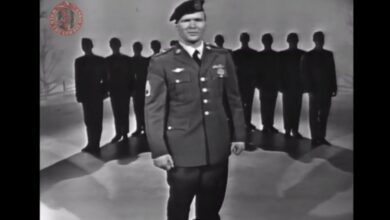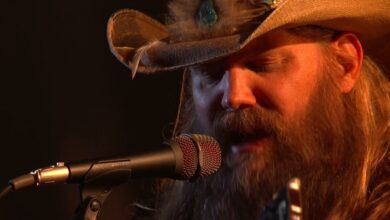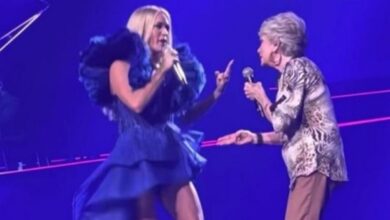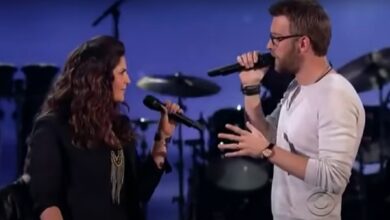Eddy Arnold and LeAnn Rimes delivered an impressive yodeling duel in “Cattle Call.”
“Cattle Call” is an iconic song that captures the spirit of the American cowboy. First recorded by Eddy Arnold in 1944, it emerged during a transformative period in country music, blending traditional sounds with the burgeoning Western swing movement. Known as the “Tennessee Plowboy,” Arnold was instrumental in shaping the genre with his smooth voice and knack for storytelling through music. His interpretation of “Cattle Call” showcases his talent, seamlessly combining classic country melodies with a fresh, evolving sound.
The song paints a vivid picture of a cowboy’s life, drawing listeners into the vast landscapes of the West. Its lyrics highlight the daily challenges faced by ranchers, forging a strong bond between the audience and the cowboy way of life. Arnold’s gentle tone and captivating yodel enhance the storytelling, allowing listeners to immerse themselves in the expansive open fields, cattle drives, and camaraderie among ranch hands.
The song’s popularity is evident in its rise to the top of the Billboard Juke Box Folk Records chart in 1945, marking a significant moment as cowboy narratives began to resonate with a broader audience. The themes of hard work, loyalty, and freedom struck a powerful chord during a time when these values were especially cherished in American culture.
While Eddy Arnold was central to the song’s initial acclaim, “Cattle Call” has become a beloved classic, covered by various artists over the years. Elvis Presley notably introduced it to a new generation in 1969 with his rock-infused version on the album “From Elvis in Memphis.” This reinterpretation demonstrated the song’s versatility and its appeal across diverse musical genres, helping to keep its relevance alive.
The lasting popularity of “Cattle Call” speaks to its cultural significance. Today, it is a common feature at country music festivals and concerts, often evoking nostalgia and fond memories among those who cherish classic country. It acts as a connection between generations, inviting younger audiences to discover the roots of the genre while resonating with older fans who appreciate their heritage.
Eddy Arnold’s legacy extends well beyond “Cattle Call.” His prolific career from the 1940s to the 2000s bore numerous hits and accolades, establishing him as one of the first superstars of country music. His distinctive style blended traditional country with pop elements, creating a refined sound that attracted a diverse audience. Arnold’s innovative approach paved the way for future artists interested in expanding the boundaries of country music.
As American culture evolves, the cowboy image—eloquently embodied in “Cattle Call”—remains a powerful symbol of independence, resilience, and adventure. The song’s evocative imagery and themes tug at the heartstrings of those longing for simpler times while celebrating the hardworking individuals who contributed to American society. This enduring connection to cowboy culture ensures that songs like “Cattle Call” continue to hold a cherished place in the musical landscape, recognized for their ability to evoke deep emotions and tell distinctly American stories.
Moreover, the song’s melody and lyrics have permeated various forms of media, solidifying its status in the greater Americana narrative. “Cattle Call” has appeared in films, television shows, and popular culture, perpetuating the cowboy story and encouraging artists to reinterpret and share their unique connections to its themes.
In essence, “Cattle Call” transcends mere musical entertainment; it symbolizes the human experience. Its embodiment of longing, adventure, and the rugged beauty of the American West ensures its lasting legacy. Over the decades, music lovers have embraced its melody, reinforcing the idea that the values of hard work, loyalty, and passion expressed in country music remain as relevant today as when the song was first performed.
In summary, “Cattle Call” is much more than a simple tune; it represents a vital piece of musical history that encapsulates the spirit of country music while narrating an important chapter of the American West. Its enduring impact reflects Eddy Arnold’s artistry and the shared memory of cowboy culture, ensuring that the song will continue to resonate with audiences for generations to come. The narrative embedded within its lyrics speaks not only of cattle and cowboys but also of shared experiences and values that unite people from diverse backgrounds and eras.





